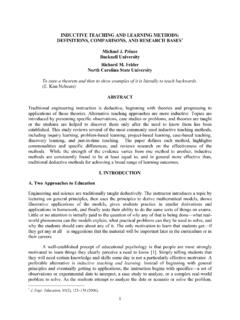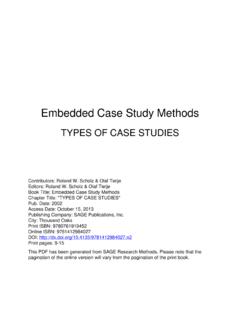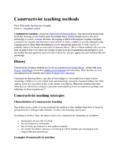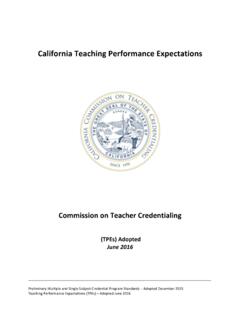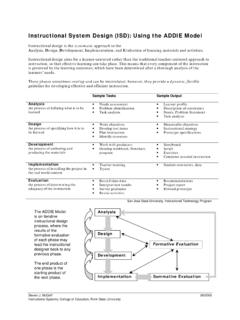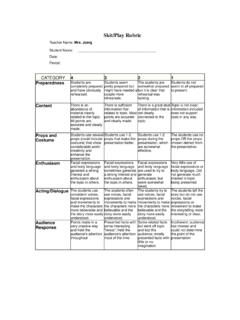Transcription of Instructional leadership: The role of heads of schools in ...
1 Instructions for authors, subscriptions and further details: Instructional leadership : The role of heads of schools in managing the Instructional programme Aaron Mkanga Manaseh1 1) Mkawawa University College of Education. United Republic of Tanzania Date of publication: January 16th, 2016 Edition period: January 2016-July 2016 To cite this article: Manaseh, (2016). Instructional leadership : The role of heads of schools in managing the Instructional programme . International Journal of Educational leadership and Management, 4(1), 30-47. doi: To link this article: PLEASE SCROLL DOWN FOR ARTICLE The terms and conditions of use are related to the Open Journal System and to Creative Commons Attribution License (CC-BY).
2 IJELM International Journal of Educational leadership and Management Vol. 4 No. 1 January 2016 pp. 30-47 2016 Hipatia Press ISSN: 2014-9018 DOI: Instructional leadership : The Role of heads of schools in managing the Instructional programme Aaron Mkanga Manaseh Mkawawa University College of Education Abstract Scholars and practitioners agree that Instructional leadership (IL) can be one of the most useful tools for creating an effective teaching and learning environment. This paper investigates the Instructional leadership practices engaged in by heads of secondary schools to enhance classroom instruction and students learning, particularly the way they manage the school Instructional programme .
3 Two objectives guided the study: to explore the informants understanding on the concept of IL; and to examine the role played by heads of schools (HoSs) in managing the Instructional programme to enhance teachers classroom instruction and students learning. It draws on the qualitative data generated from interviews, focus group discussions, and observations. The informants for this study were HoSs, senior academic masters/mistresses (SAMs), teachers and students. The study findings confirm that HoSs, SAMs, teachers and students were not familiar with the concept of IL. On the other hand, the Instructional programme was not effectively managed as heads of departments were not involved in curriculum coordination, syllabi were not covered on time, and HoSs did not undertake classroom observations or engage in review of curriculum materials.
4 The paper, however, concludes that without an effective management of the Instructional programme in favour of promoting teachers classroom instruction and students learning, efforts to that effect are doomed to fail. Keywords: Instructional leadership , Instructional programme , qualitative data inquiry, Tanzania IJELM International Journal of Educational leadership and Management Vol. 4 No. 1 January 2016 pp. 30-47 2016 Hipatia Press ISSN: 2014-9018 DOI: Liderazgo Instructivo: El Papel de los Directores de Escuela en la Gesti n del Programa de Instrucci n Aaron Mkanga Manaseh Mkawawa University College of Education Resumen Acad micos y profesionales est n de acuerdo en que el Liderazgo Instructivo (IL) puede ser una de las herramientas m s tiles para una ense anza eficaz y un ambiente de aprendizaje.
5 Este trabajo investiga las pr cticas de IL aplicadas por directores de escuelas de secundaria para mejorar la ense anza en clase y el aprendizaje de los estudiantes, en concreto, la forma c mo se gestiona el programa de instrucci n escolar. Dos objetivos guiaron el estudio: explorar la comprensi n de los informantes del concepto de IL; y examinar el papel de los directores de las escuelas en la gesti n del programa de instrucci n para mejorar la ense anza de los profesores en el aula y el aprendizaje de los estudiantes. Se basa en datos cualitativos a trav s de entrevistas, grupos de discusi n y observaciones.
6 Los informantes fueron directores de escuela, profesores veteranos, profesores y estudiantes. Los resultados del estudio confirman que ninguno de ellos estaba familiarizado con el concepto de IL. Por otro lado, el programa de instrucci n no estaba gestionado eficazmente ya que los jefes de departamento no estaban involucrados en la coordinaci n curricular, los programas de estudio no se cubr an a tiempo y los directores no llevaban a cabo observaciones en el aula o revisiones de los materiales curriculares. El estudio concluye que sin una gesti n eficaz del programa de instrucci n para promover la ense anza en el aula y el aprendizaje de los estudiantes, los esfuerzos est n condenados al fracaso.
7 32 Manaseh, Instructional leadership Palabras clave: liderazgo instructivo, programa de instrucci n, investigaci n cualitativa, Tanzania lobally, scholars agree that Instructional leadership (IL) is one of the most useful tools for creating an effective teaching and learning environment (Pustejovsky, Spillane, Heaton & Lewis, 2009; Hallinger & Walker, 2014). In Tanzania, for example, the Ministry of Education and Vocational Training (MoEVT) (2011) through the secondary education development programme II document, stipulated that, among other duties, heads of secondary schools would be responsible for supervising the teaching programme , ensuring high quality teaching and learning, effective use of time for the entire school day and a conducive teaching and learning environment.
8 Instructional leadership is an educational leadership that focuses on the core responsibility of a school , namely teaching and learning, by defining the school vision, mission and goals, managing the Instructional programme and promoting the school climate (Hoy & Miskel, 2008). King (2002) asserted that the role of an Instructional leader differs from that of a traditional school administrator in a number of meaningful ways: whereas the conventional head of school spends majority of his/her time dealing strictly with administrative duties, the head of school who is an Instructional leader is charged with redefining his/her role to become the primary learner in a community striving for excellence in education.
9 As such, it becomes the head of school s responsibility to work with teachers to manage the Instructional programme . Instructional leaders know what is happening in the classrooms and develop the capacities of their staff by building on their strengths and reducing their weaknesses (Spillane & Zuberi, 2009). Instructional leaders go beyond the traditional role of school administrators and spend a lot more time focusing on developing knowledge and implementation of the curriculum, as well as instruction and assessment (Jita, 2010). The paper argues that improvement in learning is more likely to be achieved when the leadership is instructionally focused and located closest to the classroom.
10 Despite the fact that IL is significant in promoting teachers Instructional practices and students learning, literature has shown that HoSs in Africa and Tanzania in particular, rarely engage in IL (Lwaitama & Galabawa, 2008; World Bank, 2010). IL as described as overseeing teaching and learning and supervising teachers is not a G IJELM International Journal of Educational leadership & Management, 4(1) 33 function that takes up the majority of many HoSs time. Furthermore, the recent researches on school leadership in Tanzania indicate that little has been devoted in studies relating to IL, particularly the engagement of HoSs in IL.











